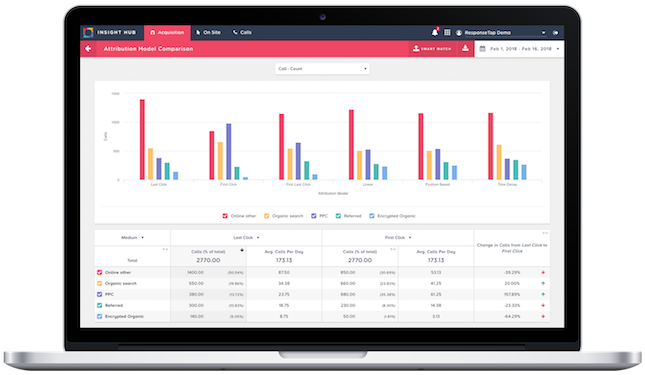May 4, 2018
Already tracking calls? What do you do when Google Call Conversion just isn’t enough?
Who should use call tracking?
Many PPC managers and marketers have heard of call tracking. But do you know enough about the role it plays in the entire marketing landscape? Call tracking is a tool for both in-house marketers and marketing agencies. From digital strategists, to PPC Managers and account directors, there are a wide range of roles who should read on.
Whether you report to management, stakeholders or clients, attributing call volume and values is probably a missing piece of the puzzle in your campaign analytics.
It’s of particular importance to call-centric companies and clients. For example, businesses in the travel, automotive, insurance and utilities industries usually convert many customers over the phone, but often their journey has started elsewhere, and this is where the value of a marketing campaign can be lost.
What is call tracking?
Call tracking, in its most basic form, is a tool that allows you to track each individual customer’s sales journey, prior to picking up the phone to speak to, or buy from, a company.
There are different levels of call tracking; campaign level tracking, visitor level tracking and Call Intelligence. There are free and paid-for tools available in today’s market.
Campaign level call tracking consists of your business, or client, using a specifically assigned telephone number to a particular marketing campaign. This is then tracked by the call tracking tool you use, and you will be able to see the exact number of calls that were generated from a campaign.
Free tools are the most commonly used today. If your marketing efforts are almost solely focused on PPC, free tools will enable you to track a phone call back to a specific PPC campaign, but only if the conversion from PPC ad to webpage visit and phone call were made in a single journey.
In today’s digital world, not many phone conversions derive from a single click, particularly in call-centric industries or for large ticket items. For these, the customer journey can be complex. If you’re booking a holiday for example, you often visit many different company websites, conduct research using social media and check out reviews online. What each customer does prior to picking up the phone will be different.
This is where the need for visitor level call tracking can help. Each visitor, instead of each campaign, is given an individual trackable telephone number. This way, when they make a call you can see exactly which campaign, source and even keyword, led them to pick up the phone. Being able to analyse each visitor gives you data on which keywords are performing best, so you can turn off the ones that aren’t.
In a nutshell, using campaign level tracking you can monitor which campaigns are successful by seeing the volume of calls generated on a last touch attribution basis. Using visitor level tracking, you can optimise campaigns thanks to the seeing the outcome of each call, as well as being able to report on multiple attribution models.

Call Intelligence meanwhile goes a step further than even visitor level tracking. As well as tracking each visitor, you can track a visitor’s entire online journey prior to the phone call over a 12 month period. You can also see the value of each call to show exact ROI, whilst the ability to integrate it into your existing stack allows you to optimise programmatic and bid management platforms.
Where does call tracking fit into your marketing strategy?
We track all aspects of our marketing campaigns, so why not phone sales?
Call tracking allows you to obtain insight into which exact marketing activity is driving phone sales. In a call-centric company this is crucial to knowing how well you are performing, or in some cases, where you are losing money.
If your business or client sells via inbound customer calls and you don’t have this call tracking data, you’re missing out on fully optimising campaigns.
Furthermore, for marketing agencies call tracking shows a client the true value of what you are doing and the results that they can attribute to your work. No speculation, just statistics that show exactly how your digital marketing skills are adding value. For in-house marketers, Call Intelligence gives you a true ROI on digital activity, so you can get the most from a campaign budget, whilst the ability to show volume and values can be useful leverage for requesting further spend from the board.
When can I use call tracking?
This part is simple. If phone calls are an important conversion point for your business, you should use call tracking when you do any form of advertising, including paid search.
Why should I use call tracking?
If you are not using call tracking and you make sales over the phone you’re not seeing a true picture of the success of your online marketing activity. You are guessing as to what ROI you’re receiving. For those companies or clients with significant digital spend and bidding for keywords in some of the toughest or largest industries, you could actually be losing money.
By using a call tracking software you can show your worth and the true value of marketing, which in the past has been notoriously difficult to do offline.